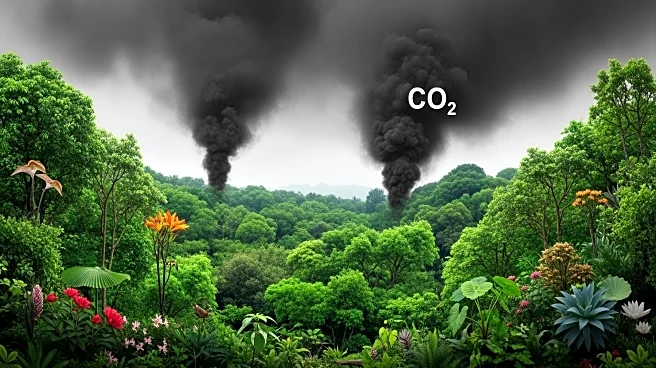What's Happening?
A recent report by Transport & Environment (T&E) highlights the negative environmental impacts of biofuel production, which is increasing carbon dioxide emissions rather than reducing them. The report indicates
that biofuels contribute to a 16% rise in emissions compared to fossil fuels. This increase is attributed to the greenhouse gases emitted during farming processes. Additionally, biofuel production drives up food prices by increasing demand for crops like wheat and corn, which are used to produce bioethanol and biodiesel. The report also points out that biofuel crops require significant irrigation, exacerbating water scarcity issues. Furthermore, the expansion of farmland for biofuel production leads to deforestation, particularly in regions like Indonesia, where rainforests are cleared for palm oil plantations, resulting in biodiversity loss.
Why It's Important?
The findings of the T&E report underscore the broader environmental and economic implications of biofuel production. The increase in CO2 emissions and biodiversity loss poses significant challenges to global efforts to combat climate change. The rise in food prices due to biofuel demand affects consumers worldwide, contributing to inflation and economic instability. The report suggests that solar energy could be a more efficient and environmentally friendly alternative, requiring less land and water. The continued support and subsidies for biofuels, driven by influential lobby groups and political interests, highlight the complexities in transitioning to sustainable energy solutions. The shipping and aviation industries' reliance on biofuels as a means to reduce emissions further complicates the situation, potentially leading to increased environmental damage.
What's Next?
The report calls for a reevaluation of biofuel policies and subsidies, urging governments and industries to consider more sustainable alternatives like solar energy. The shipping industry faces a critical decision on whether to account for land use emissions, which could significantly impact future biofuel demand. As the aviation industry sets criteria for sustainable fuels, there is potential for policy shifts that prioritize lower-emission options. The ongoing debate over biofuel production and its environmental impact may lead to increased scrutiny and pressure on policymakers to align energy strategies with climate goals. Stakeholders, including environmental groups and industry leaders, are likely to engage in discussions to address these challenges and explore viable solutions.
Beyond the Headlines
The ethical implications of biofuel production raise questions about the balance between economic interests and environmental stewardship. The report highlights the need for transparency in emissions accounting and the importance of considering long-term ecological impacts. The reliance on biofuels as a 'green' solution reflects broader issues in environmental policy, where short-term gains often overshadow sustainable practices. The potential shift towards solar energy and other renewable sources could redefine energy landscapes, prompting cultural and technological changes in how societies approach energy consumption and conservation.











